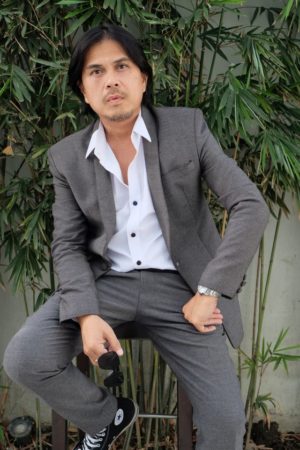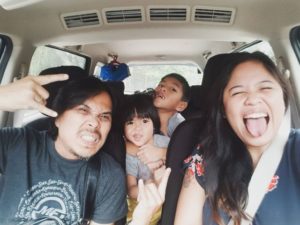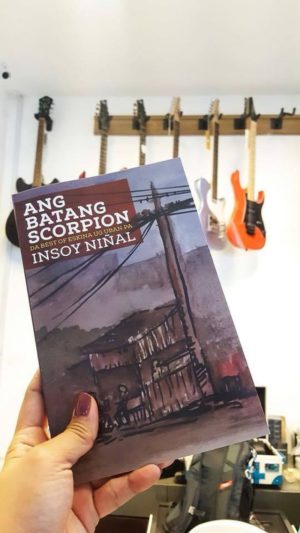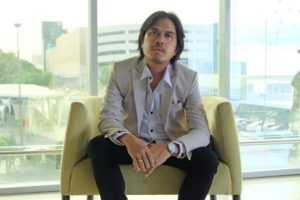
TO SAY that “Insoy” is an engaging character is quite the understatement.
Listening to him talk about his love for writing and music, one understands why his name is one of the most recognized in the local literary and music scene.
Lorenzo “Insoy” Niñal lives and breathes for the Cebuano language.
“Sa elementary pa ganahan na gyud ko mag writer. Akoang papa is a scriptwriter og mga drama sa radyo and my mom is a teacher. She taught writing classes sa elementary and nagtubo ko nga daghan og books sa balay,” explains the frontman of the hugely popular Bisrock band, Missing Filemon.
“Sa karaan nga mga times I was reading a lot of Reader’s Digest.”

On a road trip with wife, Rei and sons Ulan and Buwi
The unassuming yet noteworthy columnist, singer-songwriter, senior-high teacher, and budding entrepreneur has just added one more to his list of
“titles”: book author.
He recently released “Ang Batang Scorpion: Da Best of Eskina ug Uban Pa,” a compilation of around 50 of his best columns.
“These are personal topics, mostly close to my heart. It talks about any topic nga mahuna-hunaan nako.
The instruction given to me by my editor back then was it can be anything that I want to write about and just make it light and an easy reading, unlike most columnists nga seryoso ra kaayo,” he says.
Growing up surrounded by books, Insoy had always aspired to be a writer and his years at the seminary fueled this passion, until he eventually found another calling—working for a newspaper.
“Ang Batang Scorpion,” tackles everyday topics as well as social commentaries, his prose injected with his brand of Bisaya humor.
Here’s to a man of words, both the written and the sung. And nobody does it better than a true Cebuano.
Do you have any favorites among your write-ups?
Well, there was one—kadtong graduation nako pag elementary nga nagka sayop-sayop tanan. Ang karsones dili mao ang napalit, hasta ang polo nga
napalit hugot kaayo.
Everybody was crying kay naka graduate na lagi intawon ko and there I was crying because everything was wrong in my outfit. It’s all self-deprecating humor and I always make fun of myself in my writing. Mas ganahan ko nga ako ang subject sa katawa kaysa I use other people nga sila ang kataw-an.
So, you don’t espouse the brand of humor that borders on bullying?
Kay ang mga tawo man gud they derive pleasure in making fun of other people and sa tinuoray is, they are actually just mirroring themselves.
Did you always aspire to be a writer?
Sa elementary pa, ganahan na gyud ko mag-writer. Akoang papa is a scriptwriter ug mga drama sa radyo and my mom is a teacher, she taught writing classes sa elementary and nagtubo ko nga daghang books sa balay. Sa karaan nga mga times I was reading a lot of Reader’s Digest.
What’s your writing process like?
I make it a point to be as catchy as possible sa first two sentences, or at least sa first paragraph kay mao na siya ang make or break sa essay. Also
kinahanglan nga naay humor gyud kay you can talk about serious topics pero naa man gyuy paagi pag treat ana lightly bisan pinatyanay pa na, bahala na og dark humor. There’s always humor in everything and kinahanglan nga naay pakatawa ba kay seryoso na kaayo ang kalibutan. That goes the same with my music also. Bahala siya og seryoso but I always make it a point to put a light element in it kung seryoso na siya nga matter.
When did your affinity towards writing begin?
In the seminary. And kani laging probinsiyano and wala pa kaayo’y confidence sa kaugalingon, a monsignor in the seminary gave me the confidence to believe in myself. So ngadto nagsugod both in writing and music. Si Msgr. Rudy Villanueva ang nahulog nga akoang mentor.
Would you still remember what you first wrote about?
It was something about nature, it was about a bridge there in Lahug nga hugaw kaayo. During that time the monsignor made us go out and write anything about nature and sa una kanang DepEd nga building daghan man kaayo namuyo dira and nawala na lang ang river kay gibutangan naman og mga balay. So I wrote about it and the monsignor told me that I should have it published. I then submitted it to then Sun.Star Weekend’s editor Reina Bernaldez and they eventually published it. Maybe it was the monsignor’s recommendation that’s why they had them published, I don’t know (laughter).
Who are your writing influences?
When I was young, wala man ko’y gi-idolize nga writer because mga magazines man gyud akoang basahon. Sa music daghan kong gipang idolize like, silang Yoyoy Villame, Max Surban, Apo Hiking Society and those typical Manila sound during the 70s and 80s. Sa writing wala kaayo ko’y nailhan kay probinsiya lagi ug ang access sa foreign authors limited kaayo. Ngadto na pag-abot nako sa seminary didto na nako nailhan ang mga writers nga bangiitan kaayo, like sa local silang Erma Cuizon, Dr. Resil Mojares and Simeon Dumdum Jr. Pagsugod na gyud nako og seryoso og suwat pang-guntingon na nako ang mga write-up nilang Adonis Durado, Januar Yap ug Myke Obenieta. Eventually sa classes namo in literature, it was Dostoyevsky, Talmud and all those dark European existentialist authors. Nabuang sab ko for a while ni Jessica Zafra sa iyang “Twisted.”
So, the seminary was the place where you got exposed to Cebuano authors and their works.
I appreciate the works of Mojares and Dumdum and karon lang ko naka discover sa mga local authors kay sa seminary naa mi bias sa Bisaya kay tungod lagi anang English-only campaign. Si Monsignor Villanueva ra gyud ang nakausab kay he writes in Bisaya kung mosuwat siya og plays, songs, or drama. The general atmosphere in the seminary back then was anti-Cebuano and makasulti lang ka gamay og Bisaya nga word, pabayron dayon ka. Some would consider Cebuano writers that time as baduy and it was when I get to be introduced to Adonis and Januar nga mga Bisaya ug batan-on nga mga writers, ngadto na-abli akoang eyes. Wala lang kahibaw silang Januar ana nga akoa na silang gi-idolize.
Because to some, writing in Bisaya can be daunting …
At home ko magsuwat sa Bisaya kay dili ko mahadlok nga masayop in terms of grammar and construction. Para nako torture ang English suwaton kay daghan ka’ng i-consider.
What can you say about the emerging young local writers?
Nindot na siya kay at least hayag og kaugmaon atoang language. Outside of the spoken realm mamatay man gud ang atong kaugalingong language kung way mogamit ana and kinahanglan nga naa gyuy mosuwat ana kay ma-preserve man in writing. Kung pagsulti lang wala man tay problema ana kay ang kinahanglan kay ang pagsuwat and it can also be at the expense of another language, maybe English. Kay ang nahitabo man gud sa una pag-uso sa Bisdak, na’ay conflict ang English ug ang Bisaya and it shouldn’t be the case because the two complement with each other well. The more you write in these two languages, the more ma-enrich imong writing kay naa ma’y panahon nga mo-borrow ka og concept and idea ini nga language nga dili nimo ma-capture sa imong language. Ma-enrich nimo ang language kung mo-welcome ka og outside influences sa other languages. Mao na nga ang mga writer karon nga mga Bisaya kahibaw pud unta mosuwat og English kay tua didto ang daghan nga experiences. Daghan pa kaayo ta’ng angay makat-unan and we don’t have that much heritage that speaks in Cebuano.
How is the Cebuano writer in the time of social media?
Pabor siya kay gamit siya in terms of pag-promote sa imong writings, dinha lang dapita nga gamit kaayo siya pag-promote sa akoang book. I don’t know kay mostly mosuwat naman gud in social media and they will develop this idea nga maka write lang ka, writer na ka. And then nobody can tell you nga: “Uy! Ayaw og pataka dira!” And in social media, dili siya in the context of sa classroom nga naay mobadlong nga teachers which sa akoang generation naa na. Karon is makasuwat lang sa internet, mosulti man dayon og: Ayaw ko og hilabti kay akoa ning wall.” What about the universal standards that we always uphold? Mawala lang ba?
How do you play around with social media?
I always maintain the kind of discipline sa writing sa akong panahon nga dili lang magpataka at the same time I use it to promote my writings. It’s always about promotion and diha lang nga aspect mao na’y gamit sa akoang social media. I may give tips here and there otherwise wala na kaayo, it’s more on marketing.
You have been writing for print or the mainstream media. What’s your reaction to the industry going digital?
It’s nice nga nakaabot pa ta sa panahon nga grabe pa kabaga ang paper. I remember when I was in the seminary there were four newspapers. Imagine, what does that speak of us as a reading community. This is something that we have been expecting and dapat the mainstream media should be prepared unta, nga dili na pud mahitabo nga people had to let go of their jobs. Twenty years ago, we have been talking about this and right now it’s happening. Back then we really didn’t mind it because we were on top and now that it’s happening, the least that I am happy about is that I was part of it and I was there when the turnaround happened.

Niñal’s book features some of the best pieces from his column.
Will you recommend art and literature as a career to your kids?
I have a seven-year-old boy who is now taking up drum lessons. Naa mi’y gig kung dili na gabii kaayo pulihan niya amoang drummer and mo join siya. He’s in that direction already ug ang manghud mo piano na pero we don’t know kay basin as they grow old mausab na niya and ilaha sab na. Karon lang is naa sa ilaha ang hilig sa music and ganahan ko pero makaguol sab kay sa akoang experience there’s no money man gud sa art. Sa akoang nabantayan, sa music na’ay gamay, ug sa writing pila ra baya ug dili siya maka-support og family so I want them to go into business pero ayaw lang biyai ang art. Kay ganahan nako i-break ang cycle sa amoang family nga there’s nobody in it who is into business and it someohow perpetuates the cycle of poverty ba. At least in this generation ma-cut na unta ba, nga well-versed unta sila in running a business.
What if they’d really want to pursue the arts?
At least we would have done our part like whenever we sell (Sinugbang Sugbu) shirts, ako silang pakuyogon. For the kids makakita sila nga magtrabaho mi with my wife without actually telling them to go into business, magtan-aw sila sa ilang parents nga mangugi is already telling.
Any regrets?
Naay gamay’ng pagmahay because dugay man kaayo ka maka-realize nga importante sab gyud diay ang pag-make og money. Kana gani nga mag sige lang ka og trabaho unya kuwangon lang gihapon and late na nako na-realize nga you have to look for additional income or alternative resources kay naa na mi’y bata. Kay kung saligan lang namo amoang sweldo, dili man magsilbi. It was late because I was already in my late 30s and that realization could have been earlier if my family background was into business. My entire neighborhood ngadto sa Pinamungajan kay puro ra gyud charitable institution and I’m not saying it’s bad but nowadays one just has to survive. Ilabi na og na’ay magsalig nimo.
So you have unravelled …
Lahi na gyud (laughter). Like, kanang mga talent fee namo sa gigs it would go directly to the family. It’s not just me but for my bandmates. We would like to monetize from the art that we are doing. Kinahanglan makakwarta gyud ka and my concern is with royalties and with our laws on intellectual rights nato diri kay it’s not in place. You cannot make money out of your art unlike other countries nga maka one-hit wonder ra ka and you will still get something out of it. It’s not like that man here. It’s sad for an artist most especially with writers and those who are in the fields of literary arts and music.
As a writer, musician and businessman, how do you want to see things down the line?
I’d still want to succeed on all those fields. Siguro dili na kaayo into music because I have this feeling nga naka-contribute naman ko dira so I may as well try contributing something on other fields na sab. Right now, it’s all for my family naman gud and I still love music and the drive is there but it’s not the same drive when we were younger. Had I known nga ingon ani diay ka busy ang na’ay pamilya, unta gidaghan na lang nako akoang gipanghimo nga music sa una (laughter).


